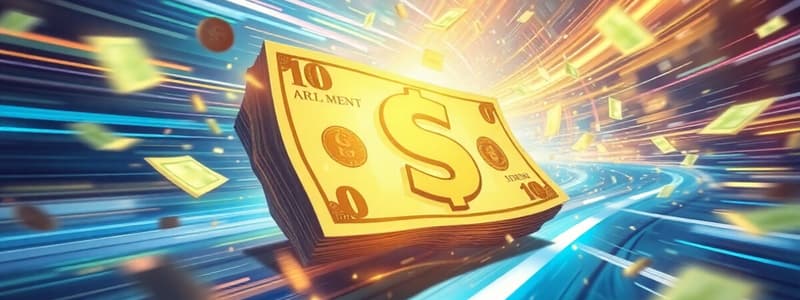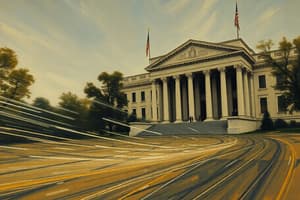Podcast
Questions and Answers
What does velocity refer to in economic terms?
What does velocity refer to in economic terms?
- The speed at which money changes hands. (correct)
- The rate of inflation within an economy.
- The total amount of money available in an economy.
- The relationship between supply and demand for goods.
In the first example provided, what is the velocity of money when each dollar is traded once in a year?
In the first example provided, what is the velocity of money when each dollar is traded once in a year?
- One (correct)
- Five
- Ten
- Zero
What would cause people to trade their money away faster?
What would cause people to trade their money away faster?
- A decrease in the number of transactions.
- An increase in the supply of money in circulation.
- A rise in prices of goods.
- A decline in the demand for money. (correct)
What is the result of a high velocity of money with a small amount of currency?
What is the result of a high velocity of money with a small amount of currency?
How is velocity calculated in the context of the Equation of Exchange?
How is velocity calculated in the context of the Equation of Exchange?
What happens to prices when the demand for dollars falls?
What happens to prices when the demand for dollars falls?
In the first stage of inflation, what do people tend to do with their money?
In the first stage of inflation, what do people tend to do with their money?
What is the relationship between demand for money and velocity?
What is the relationship between demand for money and velocity?
Which stage of inflation is characterized by people urgently trying to spend their money to avoid losing value?
Which stage of inflation is characterized by people urgently trying to spend their money to avoid losing value?
What typically happens during the second stage of inflation?
What typically happens during the second stage of inflation?
What usually happens when the government increases the money supply?
What usually happens when the government increases the money supply?
What can lead to a sudden change in spending habits affecting velocity?
What can lead to a sudden change in spending habits affecting velocity?
What effect does the velocity of money have in an economy?
What effect does the velocity of money have in an economy?
What typically occurs in economies experiencing runaway inflation?
What typically occurs in economies experiencing runaway inflation?
How do individuals generally control the velocity of money?
How do individuals generally control the velocity of money?
Flashcards
Velocity of Money
Velocity of Money
The speed at which money changes hands in an economy. It measures how often a dollar is used for transactions.
Velocity
Velocity
A measure of how many times the average dollar is spent on purchasing goods and services within a specific time period. A higher velocity signifies a faster rate of spending.
Demand for Money
Demand for Money
The willingness of individuals and businesses to hold onto money or spend it. It is influenced by factors like interest rates, inflation, and consumer confidence.
Velocity and Economic Impact
Velocity and Economic Impact
Signup and view all the flashcards
PQ
PQ
Signup and view all the flashcards
High demand for money
High demand for money
Signup and view all the flashcards
Low demand for money
Low demand for money
Signup and view all the flashcards
Inflation
Inflation
Signup and view all the flashcards
Stage 1 of Inflation
Stage 1 of Inflation
Signup and view all the flashcards
Stage 2 of Inflation
Stage 2 of Inflation
Signup and view all the flashcards
Stage 3 of Inflation
Stage 3 of Inflation
Signup and view all the flashcards
Depression or Recession
Depression or Recession
Signup and view all the flashcards
Roaring Twenties
Roaring Twenties
Signup and view all the flashcards
Great Depression
Great Depression
Signup and view all the flashcards
Study Notes
Money Velocity and Inflation
- Velocity is the rate at which money changes hands.
- A dollar traded once a year has a velocity of 1; a dollar traded five times a year has a velocity of 5.
- Velocity is calculated by dividing PQ (the total value of all goods and services traded in a period) by M1 (the money supply).
- A small amount of money can equal many transactions if it changes hands quickly.
- Falling demand for money increases money velocity, leading to faster spending and corresponding price increases (inflation), akin to increasing the money supply.
- Rising demand for money decreases money velocity, akin to decreasing the money supply, reducing spending and price increases.
- Velocity is an effect, not a cause. Demand for money is the cause and velocity is the effect.
Stages of Inflation
- Inflation typically progresses through three stages, each driven by changes in the demand for money/currency.
- Stage 1: People save money, waiting for prices to fall. Low velocity because the money isn't circulating, and prices can't rise very quickly.
- Stage 2: Money changes hands faster as people start spending to beat rising prices. Velocity increases as a little money does the work of a lot of money. Prices start rising faster than the money supply is increasing.
- Stage 3: People spend money quickly to avoid further devaluation, leading to very high velocity. Demand for the currency falls rapidly. People try to convert it to other forms of wealth. The currency loses value rapidly if it is not quickly exchanged or converted.
Controlling Velocity
- Velocity is democratically controlled by individual spending decisions.
- People change spending habits slowly unless triggered by notable events like:
- Changes in money supply by the government.
- Government's ability to enforce laws.
Historical Examples and Repeating Patterns
- World War I, 1920: Increased money supply led to a stock market boom, but later the inflation/money supply decrease led to the 1929 crash.
- Roaring 90s: Similar to the 1920s, increased money supply fuelled stock market boom, but did not significantly increase prices of goods and services. This boom also ended in a crash.
- Vietnam (1970s): Government instability caused huge velocity increases, leading to runaway inflation, as the currency lost worth.
- The US (1980s): The government tightened the money supply to combat inflation, leading to the 1980 and 1982 recessions. This brought inflation under control.
Studying That Suits You
Use AI to generate personalized quizzes and flashcards to suit your learning preferences.




